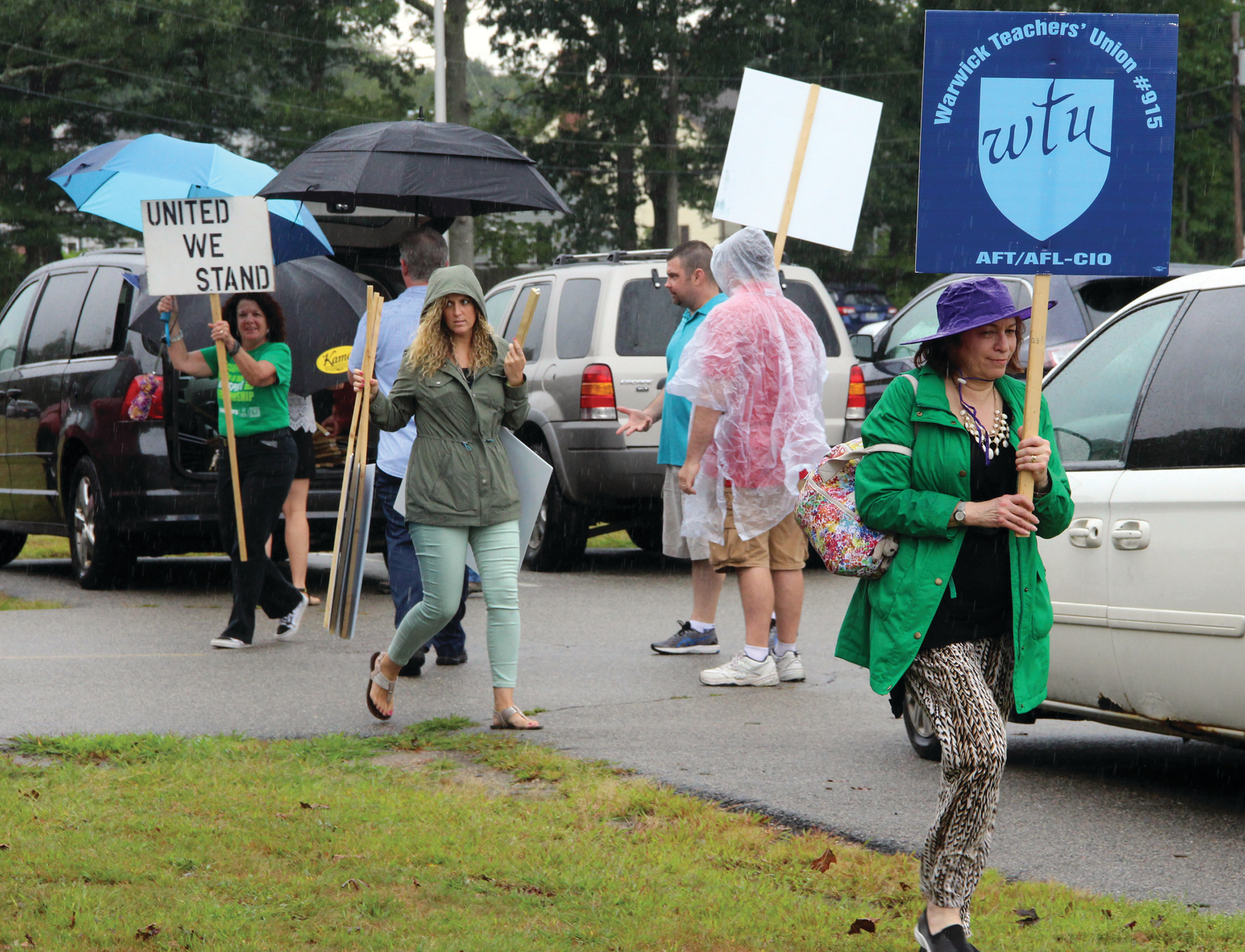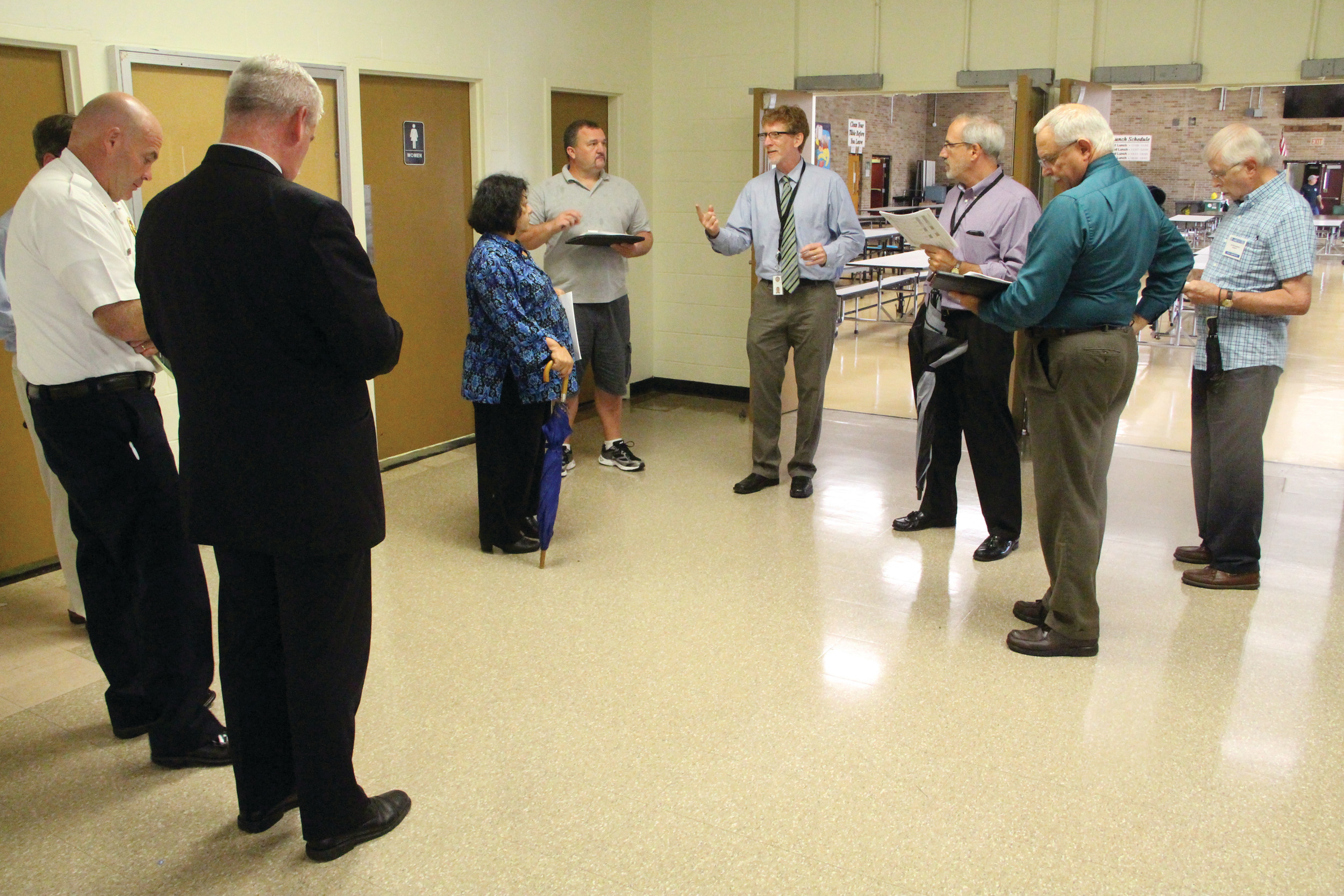Teachers take to pickets again
In the ongoing two-year teacher contract impasse, after rejecting a motion to strike according to reports, union members voted Tuesday night to work by the terms of the collective bargaining agreement (CBA) that expired in 2015. That action includes the decision not to participate in the school accreditation process as outlined by the New England Association of Schools and Colleges.
“The membership voted to reject the school committee’s final offer because, obviously, more negotiation is necessary,” said Darlene Netcoh, president of the Warwick Teacher’s Union, before headed to her Toll Gate class on Wednesday morning.
The first full day of classes for Warwick Public Schools did not pass by without contract-related activities. The union conducted an informational picket yesterday at Pilgrim High School that coincided with the administration’s “walkthrough” of the building, aimed at showing renovations and upgrades that would be addressed under a district-wide capital improvement program. The mayor, as well as City Council members and state legislators, were invited to participate.
“Until the teachers have a collective bargaining agreement, it is not business as usual in Warwick,” said Netcoh at the picket.
The union has another informational picket scheduled today between 2:30 and 4:30 p.m. outside Warwick City Hall, where road construction is ongoing but a new sidewalk has been finished.
“The mayor needs to get the school committee back to the table to negotiate and needs to use his influence with the superintendent and the school committee to get them to resolve this conflict,” Netcoh said in a statement. “The superintendent and school committee have continually violated this agreement [the 2015 CBA] between the parties and have spent an outrageous amount of money on an outside law firm. This money could have been spent on the children of the Warwick school system.”
In an interview Wednesday, Vincent Ragosta, who has served as mediator with Mayor Scott Avedisian, said he is willing to resume mediation at the request of the parties, although he added, “the School Committee doesn’t have an appetite to do that anymore.”
Avedisian thought resumption of mediation was possible. He has talked with School Committee Chair Bethany Furtado, but as of yesterday morning had not talked to Netcoh.
Ragosta, who has been acting as mediator for the past two years, said, “It has been a long process.” He felt with the union’s rejection of the last best mediated offer, which would have given teachers a 2.5 percent retroactive raise for last year and 3 percent raises this year and for 2018 and 2019, the committee is content to wait for the results of interest arbitration. Interest arbitration that paralleled mediation was finalized earlier this summer.
Arbitrator Michael Ryan shared his “leanings” with the union and School Committee and they were taken into consideration in the offer extended by the committee. The committee rejected the union’s counter offer of 3 percent raises retroactively for two years as well as the three years going forward.
“While interest arbitration may bind on some subjects,” Ragosta said, “It’s not binding on money.” He also noted from experience that “leanings are just that...an indication...and sometime when being written he’ll [Ragosta] will make adjustments.”
Ragosta thought that is “good reason” for the parties to “take ownership” of an agreement.
As to why the parties walked away from the table when there was optimism of an agreement on Aug. 23, Ragosta said that the School Committee limited what they would they would consider to the topics of the last best offer while the union looked to expand the scope of the talks.
“It got antagonistic and they dug in their heels,” he said.
Meanwhile, the union maintains that contract language is the most important element of negotiations for them, and Netcoh reported that she had already heard reports of several grievances from teachers across the district in regards to oversized classes and high percentages of students with IEPs in classrooms that exceeds the allowable amount of the previous CBA, including a Pilgrim class which allegedly had 21 of 26 students with an IEP.
Most egregious, according to Netcoh, are reports that students with IEPs in “various” elementary schools across the district are showing up to classes but are not being recorded on official class rosters, which Netcoh described as “wrong.”
Netcoh confirmed that teachers would engage in the accreditation process “as soon as there is an agreement.”
“Above all else teachers care about the contract language,” Netcoh said. “Our CBA represents 50 years of compromise… Teachers aren’t happy. Teachers are at work but obviously three years without a contract now, this isn’t right. [Superintendent] Phil Thornton has a contract. Would he be at work every day if he didn’t have a contract? No, he would not.”
Netcoh also said that the possibility of a strike is still “on the table.” Teacher strikes are illegal under state law.












